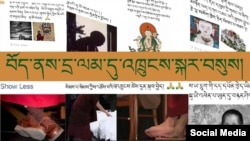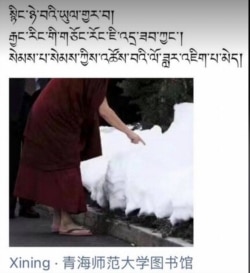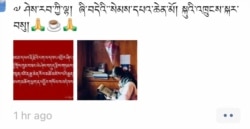When His Holiness the Dalai Lama turned 86, he observed his birthday by promising to continue serving humanity and advocating for the environment. Celebrations worldwide marked the day.
Across the Tibetan Autonomous Region, where China forbids possession and display of the Dalai Lama's image, Tibetans took to social media platforms to post birthday observations showing their devotion to the Tibetan Buddhist leader.
They shared posts of poems and prayers in Tibetan. They posted photographs of his feet, shoes, and his body's silhouette in maroon-colored robes.
Many posts referred to the Dalai Lama euphemistically as "elderly father" or "the holy man."
One message in Tibetan said, "Birthday wishes to our elderly father on July 6th."
Another Tibetan shared a poem celebrating the Dalai Lama's work. In translation, one verse reads:
"Oh elderly holy man, // Living beyond the mountain // Shines like a golden sun // His compassion and wisdom // Spreads across the world."
Other images and footage from Tibet showed Tibetans marking the day creatively. One man wore a sweater with the number "86" embroidered across the back.
VOA Tibetan contacted the Chinese Embassy in Washington via phone and email for a comment on the birthday observations but did not receive a response.
Tibetans revere the Dalai Lama, who fled his homeland in 1959 and has since lived in the northern Indian city of Dharamsala. More than 140,000 Tibetans live in exile, mostly in India. More than 6 million Tibetans live in the Tibet Autonomous Region and other autonomous prefectures in neighboring Chinese provinces.
Chinese authorities have long banned photographs of the Dalai Lama and expression of public devotion to the spiritual leader.
China accuses him of seeking to separate Tibet from China.
The Dalai Lama repeatedly has said he seeks greater autonomy for Tibet, not independence from China.
Sharing photographs of the Dalai Lama and his teachings and talks in defiance of Chinese law has resulted in Tibetans being arrested in Tibetan regions.
China has responded to international condemnation of Beijing's alleged human rights violations in Tibet by saying its actions "are China's internal affairs, and the outside world should not interfere," as Foreign Ministry Spokesperson Zhao Lijian repeated at a regular press conference on June 23.
The ban on references to the Dalai Lama is part of the effort by the Chinese Communist Party (CCP) to bring Tibetans into the Chinese mainstream, by restricting the Tibetan language and culture, according to the U.S. State Department, in a 2020 report on religious freedom.
The "Sinification" of Tibetan language and culture, coupled with Beijing's investment in infrastructure in the region, suggests "China Wants to Build a Tibet With More Wealth and Less Buddhism," according to a Bloomberg headline.
Xinghua, a media outlet controlled by the CCP, reported in February that since 2012, China has built roads that have connected 95 percent of the township-level administrations and 75 percent of the incorporated villages in the Tibet region.


